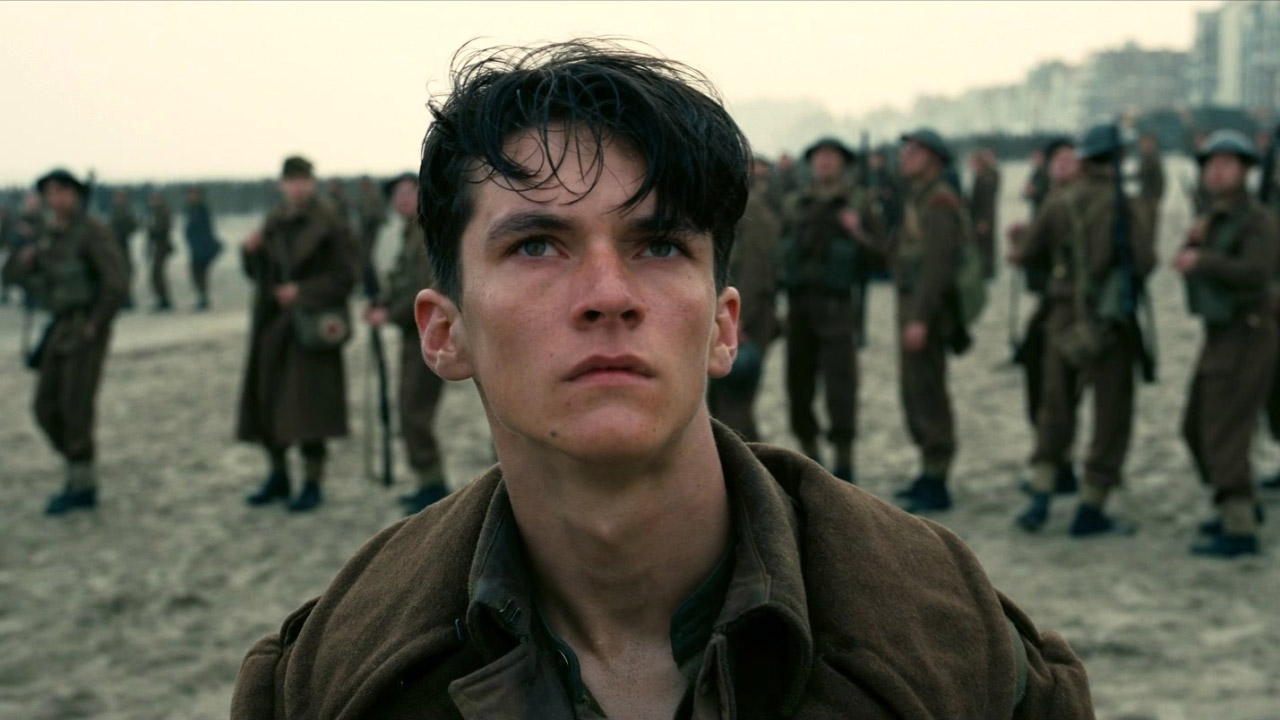Christopher Nolan is renowned for his cerebral, high-concept films, so when it was announced he would direct Dunkirk, a WWII drama based on real events, some wondered how he’d approach the subject. The result is an unflinching portrayal of war, fear, and survival that stands as a cinematic masterpiece.
Released in 2017, Dunkirk is an audacious and invigorating take on a pivotal point in the grim history of WWII, masterfully told in 106 minutes. From the first scene, the tension grips you and does not let go until the final credit rolls. It’s a visceral, consuming spectacle on its own terms, made all the more stirring because its astounding images represent real events.
Nolan’s acclaimed “unconventional” narrative structure brilliantly captures the essence of war’s pervasive uncertainties and chaos. Divided into three parts – The Mole (one week), The Sea (one day), and The Air (one hour) – the film presents each segment’s chronicles of time with their own unique intensity. The individual stories blend seamlessly, building a powerful crescendo that illustrates the scale and horror of the Dunkirk evacuation.
The cast, including Tom Hardy, Mark Rylance, Cillian Murphy, Kenneth Branagh, and relative newcomer Fionn Whitehead, deliver understated performances that convey the realities of war’s human face in an exceptionally profound way. The terror, bravery, despair, and hope are adroitly drawn through their performances. Hardy, largely hidden behind a pilot’s mask, communicates more with his eyes than many actors can with pages of dialogue.
The notable absence of a verbose script makes Dunkirk even more appealing. Nolan abandons convention to adopt an immersive storytelling approach that is appealing and affecting. The palpable fear is communicated not through words but arresting visuals, haunting sound design, and Hans Zimmer’s relentless score, where each tick of the watch compounds the intensity.
Hoyte van Hoytema’s cinematography is breathtaking in its enormity. The beautiful, wide shots of empty beaches and shimmering sea stand in stark contrast to the perilous situation, creating a fascinating visual dichotomy. The dire circumstances of war captured amidst the picturesque frames makes the raw ugliness of human conflict all the more potent.
Priceless in its contribution, the sound design of this film demands to be experienced in full Dolby theatre sound. The whine of the Spitfire engines, the shocking crack of gunfire, the ominous drone of approaching enemy aircraft, ground the audience in the action, amplifying the sense of dread and urgency.
Hans Zimmer’s score weaves into the narrative in an extraordinarily enthralling manner. The music, built around a ticking clock motif, ratchets up the tension, making it a character in itself.
Dunkirk is devoid of the Hollywood-style heroism that typifies many war dramas. It is a stirring tribute to the quiet heroism of ordinary people forced into extraordinary circumstances. Nolan doesn’t sugarcoat the realities of war; there are no clichéd speeches or acts of valor. Instead, there is a vivid depiction of abject terror and desperate survival in its most raw form.
Despite the absence of gore and bloodshed typical of war films, Dunkirk is arguably more disturbing and effective. Nolan opts for psychological impact rather than explicit violence, amplifying the distress through a meticulously crafted atmosphere of fear and unease.
In many ways, Dunkirk is a departure from Nolan’s previous works. Yet, it also holds onto his unique qualities. It experiments with time and space, engages the audience on a deeply personal level, and delves into an ambitious narrative that makes you think long after the movie concludes.
In conclusion, Dunkirk is a grim and gripping cinematic masterpiece portraying the raw realities of war in a stunning, powerful manner. It’s an audio-visual tour de force that transcends typical war drama, transporting you into the heart of the disastrous Dunkirk evacuation. Nolan’s expertise in innovative storytelling, combined with A-list performances and sublime technical competency, proves that Dunkirk is much more than a film; it’s a startlingly vivid historical experience.
It is undeniably one of the finest in the genre and certainly among Nolan’s best, reinforcing his position among the most significant filmmakers of our time. As such, Dunkirk should not just be watched, but experienced – fully, completely, and compellingly.



